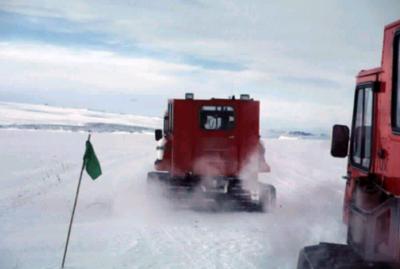
|
|
9 October, 1996
Another one of those days that never ends and not nearly enough gets
accomplished. Work today started sixteen hours ago, if it goes for another
hour it will be tomorrow. Today was the first day that the divers collected
samples from under the ice. The support team had drilled holes through the
five-foot thick sea ice several days ago and erected a dive hut. In order to
get to the hut the divers and tenders loaded all the diving equipment onto a
tracked vehicle called a spryte and drove several miles across the sea ice.
I got my first chance to drive on the sea ice. It was an interesting
experience since the spryte has no steering wheel. In order to turn you must
use the brakes. There are two hand brakes, one controls the track on left
side of the vehicle and the other controls the right track. To turn to the
right you apply the brake on the right track and allow the left to turn
freely.
The first dive team, Jim, Bill, and Chris started prepping for the dive at
about 8:30. Although we returned at 2:00 P.M., the total time the divers
were in the water was less than one half-hour. Of that time only about
fifteen minutes was spent collecting samples. Bill was only able to remain
in the water for ten minutes because his glove developed a leak. Since the
water temperature was -2 degrees Celsius, he quickly lost the use of his
hand and had to return to the surface. The afternoon dive team had similar
problems, both divers had to shorten the length of their dives because of
dry suits that didn't keep them dry. No dives are scheduled for tomorrow so
there will be one day to try to remedy the problems. In spite of the large
and well-trained support team that is available to the scientists, the
hostile environment presents a constant challenge.

Contact the TEA in the field at
.
If you cannot connect through your browser, copy the
TEA's e-mail address in the "To:" line of
your favorite e-mail package.
|
